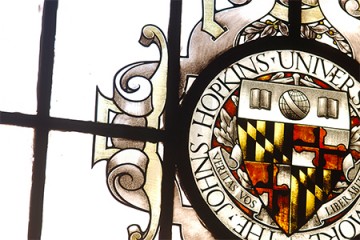Thirty-four early-career faculty members representing seven divisions of Johns Hopkins University have been selected to receive support for their work from the university's Catalyst Awards program.
Recipients include faculty composing new musical work inspired by undiscovered islands, studying blindness to better understand human brain plasticity, and simulating the atmospheres of exoplanets to predict their habitability.
Others are investigating treatments and interventions for depression, cancer, rheumatoid arthritis, HIV, and Alzheimer's disease. One awardee is developing spray-on photovoltaics for solar energy harvesting, while another is developing an effective communication model to increase the number of students utilizing school-based vision care programs.
These experts represent dozens of fields—including ophthalmology, mental health, chemistry, computer science, management, and composition. Nearly 75 percent are assistant professors, and more than half are women.
"Progress requires our brightest minds to pursue big ideas that extend the horizons of human knowledge," said Johns Hopkins University President Ronald J. Daniels. "At a time when research funding is more competitive than ever, Johns Hopkins is thrilled to support these promising faculty as they embark on novel research and creative projects."
The 2017 honorees—selected based on their accomplishments to date, creativity and originality, and their academic impact—each will receive a $75,000 grant for their research and creative endeavors. They will also have the opportunity to participate in mentoring sessions and events designed to connect these colleagues at similar stages in their careers.
The Catalyst Awards program was launched in early 2015, as was the Discovery Awards program for interdivisional collaborations. Together the two programs represent a $15 million university commitment to faculty-led research by university leadership along with the deans and directors of JHU's divisions.
The program is open to any full-time faculty member appointed to a tenure-track position within the past three to 10 years. More than 80 senior faculty members from across the university served on the committee that selected the awardees from a pool of nearly 150 submissions.
This is the third year of the Catalyst Awards program; a combined 71 faculty were recognized during the program's first two cycles. Recipients are celebrated alongside the winners of the Discovery Awards at an event each September.
"Each year, we are amazed by the talent and creativity evident in the Catalyst Award applications," said Denis Wirtz, JHU's vice provost for research. "These faculty represent the future of their fields and the future of our institution. We look forward to working with this cohort over the next year as they reach new milestones that transform the trajectory of their careers."
2017 Johns Hopkins Catalyst Award recipients
- Steven An, Department of Environmental Health and Engineering, Bloomberg School of Public Health
- Alexis Battle, Department of Computer Science, Whiting School of Engineering
- Marina Bedny, Department of Psychological and Brain Sciences, Krieger School of Arts and Sciences
- Wendy Bennett, Department of Medicine, School of Medicine
- Oscar Bettison, Department of Composition, Peabody Institute
- Frank Bosmans, Department of Physiology, School of Medicine
- Megan Collins, Wilmer Eye Institute, School of Medicine
- Erika Darrah, Department of Rheumatology, School of Medicine
- Mounya Elhilali, Department of Electrical & Computer Engineering, Whiting School of Engineering
- Elana Fertig, Department of Oncology, School of Medicine
- D. Brian Foster, Division of Cardiology, School of Medicine
- Jemima Frimpong, Management and Organization, Carey Business School
- Christine George, Department of International Health, Bloomberg School of Public Health
- Fernando Goes, Department of Psychiatry, School of Medicine
- Erin Goley, Department of Biological Chemistry, School of Medicine
- Michael Harrower, Department of Near Eastern Studies, Krieger School of Arts and Sciences
- Sarah Horst, Department of Earth and Planetary Sciences, Krieger School of Arts and Sciences
- Christian Kaiser, Department of Biology, Krieger School of Arts and Sciences
- Rebekka Klausen, Department of Chemistry, Krieger School of Arts and Sciences
- Benjamin Langmead, Department of Computer Science, Whiting School of Engineering
- Jeffrey Leek, Department of Biostatistics, Bloomberg School of Public Health
- Xin Li, Department of Computer Science, Whiting School of Engineering
- Meredith McCormack, Department of Medicine, School of Medicine
- Kelly Pate, Department of Molecular and Comparative Pathobiology, School of Medicine
- Jennifer Pluznick, Department of Physiology, School of Medicine
- Jennifer Schrack, Department of Epidemiology, Bloomberg School of Public Health
- Rebecca Schulman, Department of Chemical and Biomolecular Engineering, Whiting School of Engineering
- Adam Spira, Department of Mental Health, Bloomberg School of Public Health
- J. Webster Stayman, Department of Biomedical Engineering, School of Medicine
- Jennifer Stewart, Department of Community and Public Health, School of Nursing
- Susanna Thon, Department of Electrical & Computer Engineering, Whiting School of Engineering
- Fengyi Wan, Department of Biochemistry and Molecular Biology, Bloomberg School of Public Health
- Kenneth Witwer, Department of Molecular and Comparative Pathobiology, School of Medicine
- Vadim Zipunnikov, Department of Biostatistics, Bloomberg School of Public Health
Posted in University News, News+Info
Tagged catalyst awards








